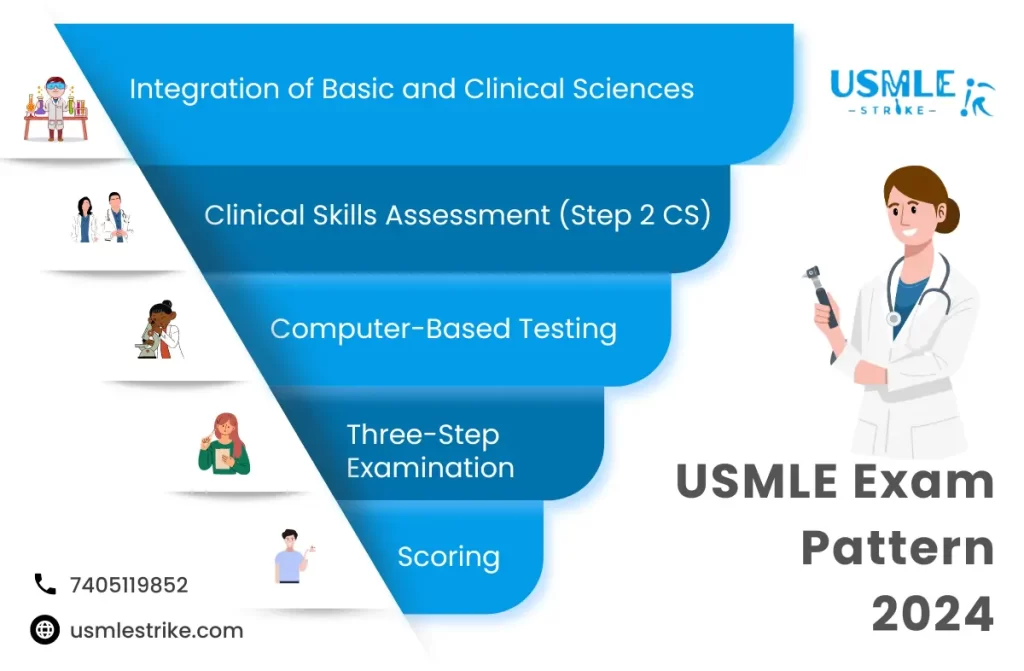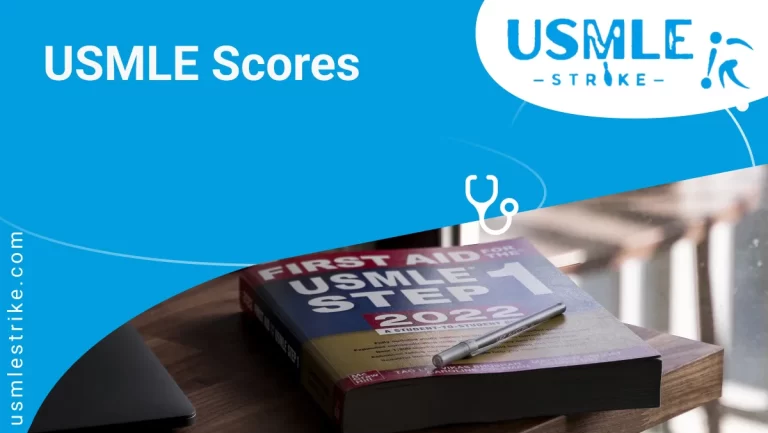USMLE (United States Medical Licensing Examination) is a standardized test that is required to be taken by medical students and graduates in order to obtain a medical license to practice in the United States. The scores obtained in this three-tier test can have a significant impact on the medical career of an individual. In this article, we will discuss the impact of USMLE scores on your medical career.

Statement from the USMLE Program Regarding Notification of Invalidated Examination Scores
For over 30 years, the United States Medical Licensing Examination (USMLE) has been verifying that physicians licensed to practice medicine in the United States possess the knowledge and clinical skills required to care for patients safely and effectively. Examinees must ensure the integrity of the testing process. The USMLE program has implemented security measures to detect any exam practices or performances that may raise questions, ensuring the validity of scores.
Examinees’ test performances are regularly monitored and analyzed for unusual score patterns or variations, as well as other information that could raise concerns about the validity of their results. The USMLE program has found a pattern of unusual exam results linked to Nepal, which raises questions about the accuracy of test scores for a group of test-takers.
This anomaly may suggest that there was unauthorized access to secure exam content. Those who have received invalidated Step scores are being informed by the USMLE Secretariat’s Office that they must take a validation exam or exams. The USMLE program is endeavoring to notify examinees who need to schedule validation exams and to assist score users and other stakeholders impacted by the validation exam requirements.
What significance does my USMLE score hold?
The USMLE comprises three distinct assessments: Step 1, Step 2 CK (Clinical Knowledge), and Step 3. Scores for the USMLE are depicted on a scale ranging from 1 to 300, except for Step 1, which is simply marked as pass/fail. It is imperative to pass all three steps of the USMLE to obtain medical licensure in the United States. However, each step carries its own importance and advantages. Passing Step 1 of the USMLE during your second year of medical school enables you to initiate supervised medical practice. Achieving success in Step 2 CK and Step 3, along with obtaining a commendable score, enhances your competitiveness for residency programs and fellowships. Upon passing the final Step 3 of the USMLE, you become eligible for a medical license.
The USMLE Program has updated its score reporting timeline
Special score delay periods for the Step examinations will no longer be implemented. Exam scores will usually be reported within four weeks of an examinee’s completion of the exam. However, score reporting may be delayed in rare cases due to various factors. When selecting your test date and requesting results, please allow at least eight weeks for your score report to be available.
How to Study for Step 1 Exam ?
The USMLE Step 1 exam comprehensively tests your understanding from the first two years of preclinical medical education, with scores playing a crucial role in your residency applications. If you are concluding your preclinical courses, aim for 6-9 weeks of intensive study before the exam. However, if it has been six months or more since you completed these courses, a preparation period of 6-9 months is advisable. Before diving into specific study strategies or methods for choosing the best answers, it’s crucial to develop a personalized study plan tailored to maximize your USMLE Scores.
Impact of Considering USMLE Scores
Here are some of the ways that scores of the USMLE exam can impact your medical career:
Residency Programs
The first step of the USMLE exam is usually taken by medical students in their second year of medical school, and the second and third steps are taken during or after medical school. Residency programs are highly competitive, and many programs require a minimum USMLE score for applicants to be considered.
Residency programs use USMLE scores as one of the factors to evaluate the knowledge and competency of applicants. A higher USMLE score can increase your chances of being selected for a residency program, especially in competitive fields such as surgery and dermatology.
Fellowship Programs
After completing residency, some medical professionals may choose to pursue a fellowship program. Fellowship programs are also highly competitive, and many programs require a minimum USMLE score.
A high USMLE score can increase your chances of being selected for a fellowship program, especially in competitive fields such as cardiology and gastroenterology.
Board Certification
Board certification is the process by which medical professionals are recognized as experts in a particular specialty. Board certification is not required to practice medicine, but it can enhance a medical professional’s reputation and increase their earning potential.
USMLE scores are often used as one of the criteria for board certification. A high USMLE score can help medical professionals to achieve board certification in their chosen specialty.
Job Opportunities
Many employers, including hospitals, clinics, and private practices, consider scores of USMLE when evaluating job applicants. A high USMLE score can demonstrate that a medical professional has a strong foundation in medical knowledge and can be an asset to the organization.
Also, a high USMLE pass rate can also be an advantage when negotiating salary and benefits.
Research Opportunities
The scores of USMLE can also impact research opportunities for medical professionals. Many research programs require a minimum USMLE score for applicants.
A high score secured in the USMLE exam can increase the chances of being selected for research opportunities, especially in competitive fields such as oncology and neuroscience.
Personal Development
Preparing for the USMLE exam requires discipline, dedication, and hard work. The process of studying for the exam can help medical professionals to develop study skills, time management skills, and critical thinking skills. These skills can be valuable throughout a medical career.
In addition to these impacts, there are a few other things to consider when it comes to scoring in the USMLE:
Retaking the Exam
If you do not receive the USMLE scores that you were hoping for on the USMLE, you may consider retaking the exam. While it is possible to retake the USMLE, it is important to keep in mind that residency programs may see all of your scores, and multiple attempts at the exam may be seen as a red flag.
Studying for the Exam
Studying for the USMLE can be a significant time commitment, and it is important to be prepared for the exam. Many students use study resources such as review books, question banks, and practice exams to help them prepare for the USMLE.
Balancing Priorities
While the USMLE is an important factor in your medical career, it is also important to balance your priorities. It can be tempting to focus all of your energy on studying for the USMLE, but it is important to also prioritize other aspects of your life, such as maintaining your physical and mental health.
The USMLE pass rate can have a significant impact on the medical career of an individual. A high USMLE score can increase the chances of being selected for these opportunities and can enhance the reputation and earning potential of medical professionals.
How to Study for Step 2 CK Exam ?
The Clinical Knowledge (CK) section of the USMLE consists solely of clinical scenario-based questions. You will need to analyze patient descriptions to determine diagnoses, prognoses, underlying disease mechanisms, and appropriate next steps in treatment, including preventive strategies. Utilizing a Qbank is highly recommended to become accustomed to the format and types of questions on the test. For comprehensive strategies and tips to maximize your USMLE Scores, refer to our detailed guide on achieving a high score on the USMLE Step 2 CK.
Invalidation of USMLE Examination Scores Statement
Intealth received notification from the USMLE program that the examination scores of several test takers have been invalidated due to anomalous exam performance associated with Nepal. USMLE has directly contacted affected individuals regarding their exam performance status.
To obtain ECFMG Certification, medical science examinees must pass Step 1 and Step 2 Clinical Knowledge of USMLE. This requirement is essential and a fundamental component of ECFMG Certification. Therefore, the USMLE program’s decision to invalidate these test scores implies that invalidated test:
- scores no longer fulfil the requirements for ECFMG Certification.
- ECFMG Certificates issued to individuals with invalidated test scores are also invalidated. These individuals are no longer considered ECFMG Certified.
- Applicants with invalidated test scores, who were previously verified by the National Resident Matching Program (NRMP) as meeting the examination requirements for ECFMG Certification, will now be verified as not meeting the examination requirements for ECFMG Certification.
- Status reports on ECFMG certification that were previously sent to residency programs, employers, U.S. state medical boards, and/or other organizations will be resent with updated information. This updated information will state that an impacted individual is not ECFMG certified and does not meet the examination requirements for ECFMG certification.
- It is important to note that invalidation of USMLE Step 3 scores does not impact ECFMG certification.
- Those sponsored by ECFMG on a J-1 visa may face implications.
Intealth acknowledges that the invalidation of USMLE test scores may have significant consequences. We are aware of our responsibility to the American public and the assurances that the ECFMG Certificate provides regarding the qualifications and competency of international medical graduates in the U.S. public health system. Intealth is currently contacting affected test takers to provide them with specific information related to their ECFMG Certification status.
USMLE Exam Passing Score
The current minimum passing scores are:
Step 1: Reported as pass/fail only*
Step 2 CK: 214
Step 3: 200
How to Study for Step 3 Exam ?
To effectively prepare for USMLE Step 3, engage thoroughly with various Qbanks and consider enrolling in an on-demand or live online USMLE Step 3 preparation course to ensure your success. This two-day examination includes multiple-choice questions and computer-based case simulations, marking the final evaluation of your readiness to manage patient care independently. USMLE Scores play a crucial role in determining your eligibility for residency programs and future medical practice.
Conclusion
However, it is important to note that USMLE scores are just one of many factors that are considered when evaluating medical professionals. Other factors such as clinical experience, letters of recommendation, and personal qualities are also important.
Read Also: USMLE in Pakistan





